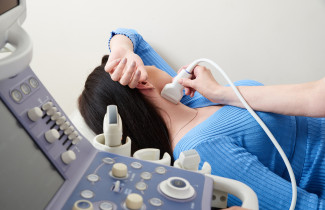Andrew Agbaje has been selected as the winner of the Journal of Human Hypertension Young Investigator Award 2023. The award is aimed at recognising exceptional research outcomes. The journal values novel research that has the potential to make an important impact on patient care or substantially enhance the understanding of hypertension pathophysiology. The award is given to the best full-length original article accepted for publication within a year.
Andrew Agbaje is a physician and associate professor (docent) of clinical epidemiology and child health at the University of Eastern Finland. In the awarded article, he showed among 1574 adolescents from the Avon Longitudinal Study of Parents and Children (ALSPAC) UK birth cohort, that sedentary time was not cross-sectionally associated with arterial stiffness. However, higher light physical activity was associated with lower carotid-femoral pulse wave velocity, a marker of arterial stiffness, and higher carotid elasticity. “These findings are of public health significance in the adolescent population, particularly among those who are unable to engage in vigorous exercise due to concurrent morbidities or lack of interest,” Agbaje says
Higher moderate-to-vigorous physical activity was associated with higher carotid intima-media thickness and carotid elasticity with higher lean mass explaining one-third of the relationships. This is suggestive of physiologic exercise-induced vascular remodeling, necessitating answering the same question in longitudinal design to assess the consistency of the results.
In a longitudinal analysis published in a different journal, Agbaje and his team discovered that accumulating >6 hours/day of sedentary time in childhood may independently contribute 10% to the 7-year increase in arterial stiffness during growth from adolescence to young adulthood. The significant adverse effect of sedentary time on vascular indices may be observed only after long-term exposure. He also found that light physical activity consistently reduced arterial stiffness in both cross-sectional and longitudinal studies. However, moderate-to-vigorous physical activity contributes to exercise-induced physiologic vascular remodeling in both cross-sectional and longitudinal studies. Agbaje has previously discovered that arterial stiffness is a novel causal risk factor for elevated blood pressure and hypertension, premature cardiac damage, obesity, insulin resistance, and metabolic syndrome in children and adolescents. Thus, efforts targeted at lowering arterial stiffness in the young population such as engaging in light exercise like walking, may significantly promote health and preventive diseases.
Artery Society recognizes Agbaje with a Career Development Lecture
At the Artery Society 2024 Annual meeting in Cardiff, UK, Agbaje was invited to give a Career Development Lecture. The Lecture provides a platform to disseminate information about a researcher’s work on the theme of large arteries, highlighting and contextualizing important findings and achievements from their career to date, as well as presenting future plans.
Agbaje's lecture was titled “Arterial stiffness – a causal risk factor for hypertension, obesity, insulin resistance, metabolic syndrome and cardiac damage in adolescents.”
“Science is progressive, but extrapolating findings in adults to children and adolescent research may not be optimal in detecting the earliest changes in cardiovascular and metabolic health in the young population. Thus, well-collected gold-standard longitudinal data in the young population may lead to a paradigm shift but not without a fight against entrenched dogmas. Let’s keep fighting for kids’ health because today’s kids are tomorrow’s adults,” says Agbaje.
“None of these awards and recognition would have been possible without the extraordinary research collaboration between the University of Eastern Finland, the University of Bristol, and the University of Exeter in the UK, and the financial support of several funders. We appreciate the Children of the 90s who continue to participate in the three-decade long study, contributing world-class data that is updating paediatric cardiovascular health sciences,” Agbaje concludes.
Agbaje’s research group (urFIT-CHILD) is supported by research grants from Jenny and Antti Wihuri Foundation, the Finnish Cultural Foundation Central Fund, the Finnish Cultural Foundation North Savo Regional Fund, the Orion Research Foundation, the Aarne Koskelo Foundation, the Antti and Tyyne Soininen Foundation, the Paulo Foundation, the Yrjö Jahnsson Foundation, the Paavo Nurmi Foundation, the Finnish Foundation for Cardiovascular Research, Ida Montin Foundation, Eino Räsänen Fund, Matti and Vappu Maukonen Fund, the Foundation for Pediatric Research, Alfred Kordelin Foundation, and the European Association for the Study of Obesity - Novo Nordisk Foundation.
For further information, please contact:
Andrew Agbaje, MD, MPH, PhD, FESC, FAHA, FNYAM, Cert. Clinical Research (Harvard), Professor (associate) of Clinical Epidemiology and Child Health, Principal Investigator (urFIT-child). Institute of Public Health and Clinical Nutrition, School of Medicine, University of Eastern Finland, Kuopio, Finland. andrew.agbaje(a)uef.fi, +358 46 896 5633
Honorary Research Fellow – Children's Health and Exercise Research Centre, Public Health and Sports Sciences Department, Faculty of Health and Life Sciences, University of Exeter, Exeter, UK. [email protected], https://uefconnect.uef.fi/en/person/andrew.agbaje/
Webpage: urFIT-CHILD Research group
Link to the Award Announcement:
Agbaje, A.O. JHH Young Investigator Award 2023: interview with the winner Andrew O. Agbaje. J Hum Hypertens (2024). https://doi.org/10.1038/s41371-024-00974-7
Link to the paper selected for the award:
Agbaje AO. Mediating effect of fat mass, lean mass, blood pressure and insulin resistance on the associations of accelerometer-based sedentary time and physical activity with arterial stiffness, carotid IMT and carotid elasticity in 1574 adolescents. J Hum Hypertens. 2024 May;38(5):393-403. https://doi.org/10.1038/s41371-024-00905-6
Link to the other paper mentioned:
Agbaje AO, Barker AR, Lewandowski AJ, Leeson P, Tuomainen TP. Accelerometer-based sedentary time, light physical activity, and moderate-to-vigorous physical activity from childhood with arterial stiffness and carotid IMT progression: A 13-year longitudinal study of 1339 children. Acta Physiol (Oxf). 2024 May;240(5):e14132. doi: 10.1111/apha.14132



